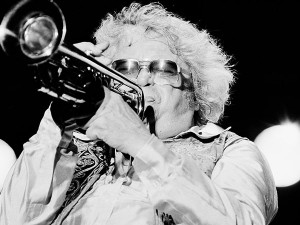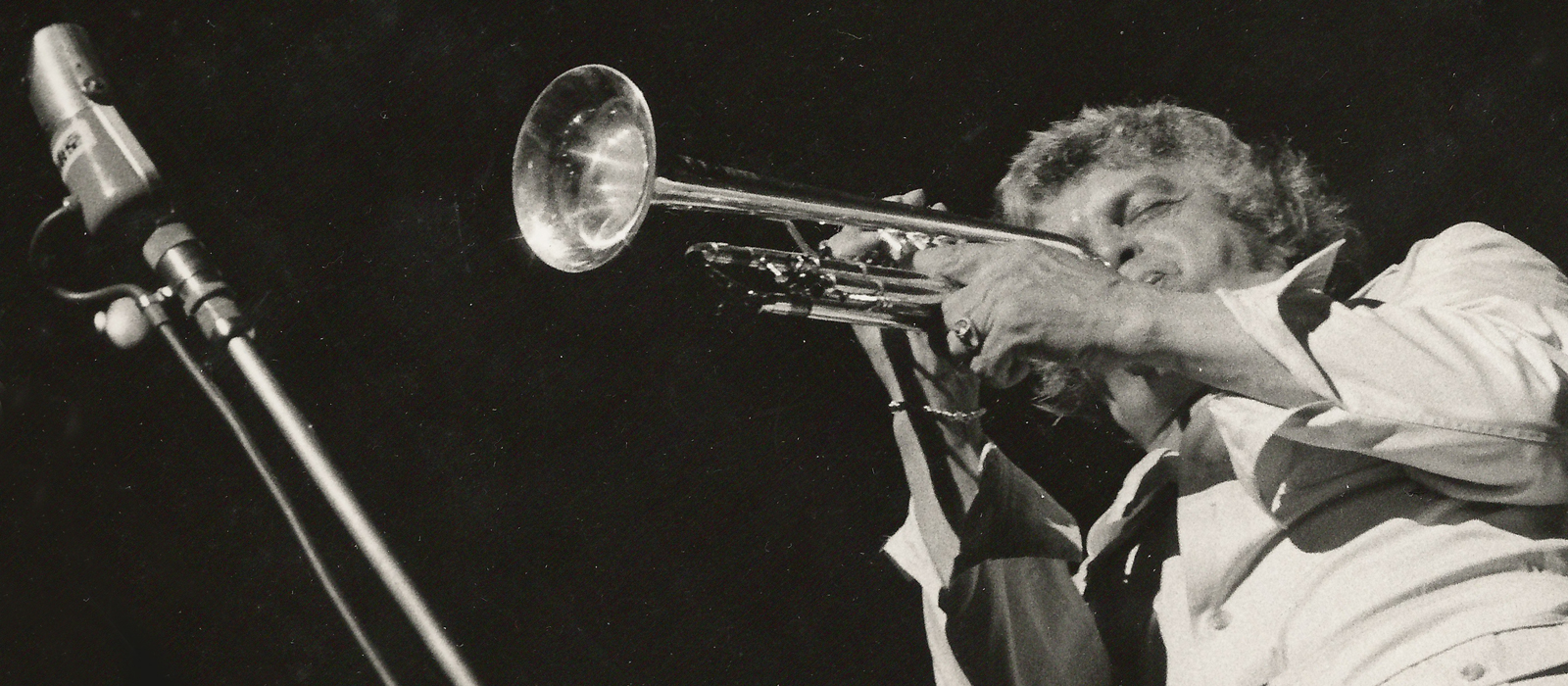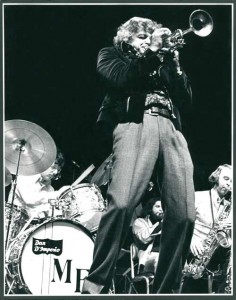Maynard Ferguson
Jazz legend Maynard Ferguson far surpassed the title “trumpet player”; he was an internationally renowned big-band leader, one of the world’s great brass players, composer, arranger, dedicated music educator and instrument designer. He was a three-time Grammy nominee with innumerable awards celebrating his diverse career. LeRoy Neiman painted him blowing out the torch for the 1976 Montreal Olympics and over his lifetime several American cities and towns have celebrated “Maynard Ferguson Day.”
Walter Maynard Ferguson, was born in 1928 in the general hospital in Verdun, Canada. At age nine, after violin and piano lessons, he spotted a man playing cornet at a church social and it was to be the beginning of one of the most successful careers in modern music history.
Ferguson soloed as a child prodigy with the Canadian Broadcasting Company Orchestra at age eleven and by sixteen was leading warm up bands for Basie, Ellington, Woody Herman, Kenton, Dizzy and both Dorsey brothers. Already a sensational showman with phenomenal technique on the trumpet, Maynard’s unique ability to play rich, beautiful notes in the instrument’s upper register was groundbreaking.
In 1947 Maynard had made it to the United States and joined the exciting Boyd Raeburn band followed by a short stint with the Jimmy Dorsey Orchestra. Then in 1949 he joined the Charlie Barnet Orchestra and received rave reviews for his performance on “All The Things You Are.” He came to national attention in 1950 with a four-minute televised cavalcade on “The Ed Sullivan Show,” backed by Stan Kenton’s big band.
 In 1956 Ferguson moved to New York and set the jazz world aflame with his innovative all-star Birdland Dreamband. Some of the arrangers were Johnny Mandel, Bill Holman, Quincy Jones, Al Cohn, Manny Album, Ernie Wilkins, Bob Brookmeyer, and Willie Maiden. Maynard worked tirelessly at Birdland, often sharing the bill with Miles Davis doing five shows a night each http://www.bronsonpharmacy.com/product/haldol/.
In 1956 Ferguson moved to New York and set the jazz world aflame with his innovative all-star Birdland Dreamband. Some of the arrangers were Johnny Mandel, Bill Holman, Quincy Jones, Al Cohn, Manny Album, Ernie Wilkins, Bob Brookmeyer, and Willie Maiden. Maynard worked tirelessly at Birdland, often sharing the bill with Miles Davis doing five shows a night each http://www.bronsonpharmacy.com/product/haldol/.
Ferguson would create and lead several thirteen-piece orchestras through out the 1950s and 1960s but by 1967 interest in big bands had faded and the bandleader moved to England. There he was re-energized by the European music scene and greatly influenced by the music of India. He signed with CBS London and his popularity skyrocketed with his recordings of contemporary music arranged with ‘rock’ rhythms and exciting brass.
Jazz purists may have wished that Ferguson had stayed with his earlier music, but they couldn’t deny the positive influence he was having on young audiences. He was playing the music of their generation with a thrilling euphoric big band sound. Jazz education was booming and kids across the country were trying to play trumpet like Maynard.
Ferguson returned to America and toured the country for the rest of his career. His contract with CBS led to the recording of the famous “Gonna Fly Now” theme from Rocky. This catapulted Maynard into “Pop” popularity with a top 10 single, a gold album, and a 1978 Grammy nomination.
Always true to his mantra that music is about change, Ferguson emerged from big-band swing and worked his way through jazz, bebop, East Indian fusion, rock, funk, disco, and back to traditional jazz. Besides numerous Playboy, Billboard and Down Beat Jazz Poll awards as bandleader, trumpet player, big band, and trombone player, Maynard Ferguson was inducted into the Down Beat Hall of Fame (1992), the Canadian Music Hall of Fame and received Canada’s Medal of Honor.
Maynard Ferguson was 78 when he passed away August 23rd, 2006. He was home with his family after a sold out week at the Blue Note in New York and had just completed what would be his final recording.
Over seven decades, with almost nightly performances at festivals, concert halls, jazz clubs, and universities around the globe, Ferguson has left his imprint on the jazz world through the musicians that came up through his bands: players like Chuck Mangione, Wayne Shorter, Chick Corea, Slide Hampton and Peter Erskine to name a few. Not to forget the thousands of young students he turned on to jazz and inspired to develop their own unique sound.



